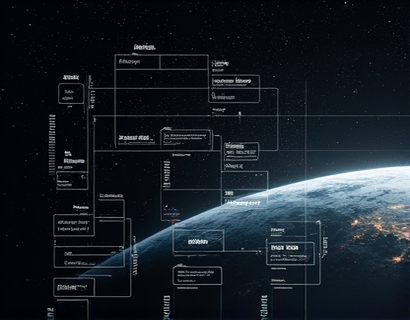Decentralized DAO Management: Leveraging Advanced Analytics for Enhanced Governance and Sustainable Growth
In the rapidly evolving landscape of decentralized finance and autonomous organizations, the role of governance has become increasingly critical. Decentralized Autonomous Organizations (DAOs) represent a novel approach to management, leveraging blockchain technology to create transparent, community-driven entities. However, effective governance in DAOs is challenging due to the complexity and scale of operations. Advanced analytics emerges as a pivotal tool in transforming DAO governance, enabling administrators to make informed decisions, enhance collaboration, and ensure sustainable growth. This article delves into how leveraging advanced analytics can revolutionize DAO management, providing a comprehensive guide for DAO managers and administrators.
Understanding DAO Governance
DAO governance refers to the processes and mechanisms through which a DAO is directed and controlled. Unlike traditional organizations, DAOs operate on smart contracts deployed on blockchain networks, which execute predefined rules and decisions based on community input. This decentralized approach aims to eliminate central points of failure and increase transparency. However, the decentralized nature also introduces challenges such as decision-making bottlenecks, lack of expertise, and potential conflicts among stakeholders. Advanced analytics can address these issues by providing insights and tools that streamline governance processes.
Challenges in Traditional DAO Governance
Traditional DAO governance faces several challenges that can hinder effective management and growth. One major issue is the complexity of decision-making in a decentralized environment. With numerous stakeholders contributing to proposals and votes, reaching consensus can be time-consuming and inefficient. Additionally, the lack of specialized knowledge among community members can lead to suboptimal decisions. Another challenge is the transparency and accountability of governance actions. Ensuring that all decisions and transactions are visible and verifiable is crucial for maintaining trust within the DAO. Advanced analytics can mitigate these challenges by offering robust solutions for data management, decision support, and transparency.
Role of Advanced Analytics in DAO Governance
Advanced analytics plays a transformative role in DAO governance by providing tools and insights that enhance decision-making, streamline processes, and foster collaboration. Here are some key ways advanced analytics can benefit DAOs:
- Data-Driven Decision Making: Advanced analytics tools can process large volumes of data from various sources, including blockchain transactions, community feedback, and external market indicators. By analyzing this data, administrators can identify trends, patterns, and insights that inform strategic decisions. This data-driven approach reduces the reliance on intuition and increases the likelihood of making effective, well-supported choices.
- Enhanced Collaboration:
- Improved Transparency and Accountability:
- Risk Management and Compliance:
- Community Engagement and Feedback:
Collaboration is essential for the success of any DAO. Advanced analytics platforms can facilitate better collaboration by providing shared dashboards and real-time data access. Administrators and community members can monitor key metrics, track progress, and engage in informed discussions. This transparency and accessibility foster a more cohesive and productive community.
Transparency is a cornerstone of DAO governance. Advanced analytics tools can ensure that all governance actions and transactions are recorded and visible to all stakeholders. This not only builds trust but also holds administrators accountable for their decisions. Real-time reporting and audit trails enable community members to verify the integrity of governance processes.
DAOs operate in a regulatory landscape that is still evolving. Advanced analytics can help identify potential risks and ensure compliance with relevant laws and regulations. By monitoring compliance metrics and alerting administrators to potential issues, these tools help mitigate legal and financial risks.
Understanding community sentiment and preferences is crucial for effective governance. Advanced analytics can analyze community feedback from various channels, such as social media, forums, and surveys. This insights-driven approach allows administrators to tailor their strategies to better align with community needs and expectations.
Implementing Advanced Analytics in DAO Management
To leverage advanced analytics effectively, DAOs need to adopt a structured approach to implementation. Here are the key steps to consider:
1. Define Objectives and KPIs
The first step is to clearly define the objectives and key performance indicators (KPIs) for the DAO. This involves identifying the specific areas where analytics can add value, such as decision-making efficiency, community engagement, or financial performance. Establishing clear KPIs ensures that the analytics efforts are aligned with the DAO's overall goals.
2. Select the Right Analytics Tools
Choosing the appropriate analytics tools is crucial for successful implementation. Consider tools that offer scalability, flexibility, and integration with blockchain platforms. Look for solutions that provide comprehensive data visualization, advanced reporting, and real-time monitoring capabilities. Open-source tools and platforms that support custom development can also be viable options depending on the DAO's technical expertise.
3. Data Collection and Integration
Effective analytics relies on high-quality, relevant data. Implement a robust data collection system that gathers data from various sources, including blockchain transactions, community interactions, and external data feeds. Ensure that data is cleaned, normalized, and integrated into a centralized repository for easy access and analysis.
4. Build a Data-Driven Culture
Adopting advanced analytics requires a cultural shift towards data-driven decision-making. Educate administrators and community members about the benefits of analytics and how to interpret and act on insights. Encourage a mindset that values evidence-based decisions and continuous learning.
5. Continuous Monitoring and Improvement
Once analytics tools are in place, continuous monitoring and improvement are essential. Regularly review KPIs and analytics reports to assess the effectiveness of governance processes. Use feedback loops to refine analytics models and tools, ensuring they remain relevant and effective. Stay updated on new analytics techniques and technologies to stay ahead in the evolving DAO landscape.
Case Studies and Success Stories
Several DAOs have successfully implemented advanced analytics to enhance governance and drive sustainable growth. Here are a few notable examples:
Case Study 1: Decentralized Governance Platform
A prominent decentralized governance platform integrated advanced analytics to optimize its decision-making process. By analyzing community proposals and votes, the platform identified trends in community preferences and streamlined the proposal review process. This led to a 30% reduction in decision-making time and a significant increase in community participation. The platform also implemented real-time dashboards for transparency, allowing members to track governance activities and hold administrators accountable.
Case Study 2: Financial DAO
A financial DAO focused on decentralized lending and borrowing utilized advanced analytics to manage risk and ensure compliance. By monitoring key financial metrics and market indicators, the DAO could proactively adjust lending parameters and mitigate potential losses. The analytics tools also provided detailed reports for regulatory compliance, helping the DAO navigate complex legal requirements. This approach not only enhanced financial stability but also built trust among investors and borrowers.
Future Trends in DAO Analytics
The intersection of DAOs and advanced analytics is an evolving field with exciting future trends. Some key developments to watch include:
- Machine Learning and AI: The integration of machine learning and artificial intelligence will enhance predictive analytics and automated decision-making. These technologies can identify complex patterns and make recommendations based on historical data and real-time insights.
- Decentralized Data Marketplaces:
- Interoperability and Cross-Chain Analytics:
Decentralized data marketplaces will enable DAOs to buy and sell data securely and transparently. This will provide access to a wider range of data sources, further enriching analytics capabilities.
As blockchain ecosystems become more interconnected, cross-chain analytics will become increasingly important. Tools that can aggregate and analyze data across multiple blockchains will enhance the comprehensiveness of insights for DAOs operating in a multi-chain environment.
Conclusion
Advanced analytics is a powerful tool for transforming DAO governance, offering solutions to complex challenges and driving sustainable growth. By leveraging data-driven insights, DAOs can make informed decisions, enhance collaboration, and ensure transparency and accountability. As the field continues to evolve, embracing advanced analytics will be essential for DAOs aiming to thrive in the decentralized ecosystem. Whether you are a seasoned DAO administrator or new to the space, understanding and implementing advanced analytics can significantly enhance your organization's effectiveness and success.










































